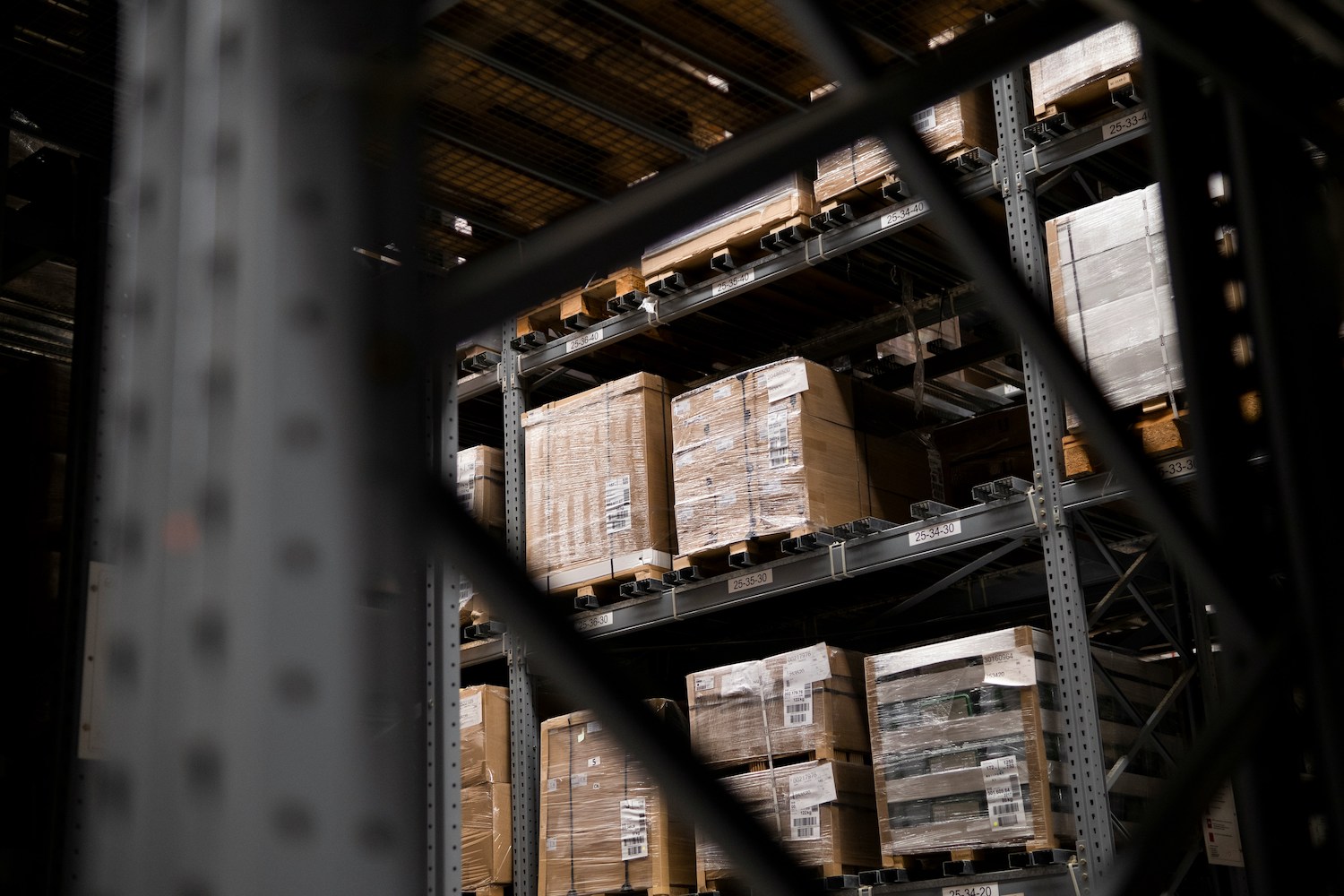Inventory management in logistics: Opportunities and challenges
This article will guide you through the main challenges and opportunities posed by inventory management in logistics. You will learn more about the processes involved in achieving maximum productivity and efficiency in your warehouse. Inventory handling, storing, and shipping can run smoothly by adopting some best practices and the right tools.

Ioana Neamt

What is inventory management in logistics?
Great question, we should probably start off by explaining it. Here goes everything, hopefully.
Inventory management in the context of logistics encompasses how stock is stored, handled, or shipped, and getting it right is key to a successful business. No matter the industry, the same best practices apply, and this article will provide a complete guide to the top opportunities and benefits of applying these best practices to your inventory management.
Of course, it’s not always straightforward, and challenges will arise. So, we will also guide you through navigating some of the top challenges posed by *checks notes* Ah yes, inventory management in the context of a logistics setting.
We’ll start by listing the challenges while also giving some solutions, as many of these issues can be mitigated with the adoption of software and training sessions for your staff. Then, we will turn our attention to the main opportunities and benefits of adopting inventory management strategies and the right software for your business.
Five main challenges of inventory management in logistics
Let’s go over the key challenges together, but don’t worry, we will also provide solutions and advice on how to address them. As long as you are aware that these can impact your business, then you will be equipped to approach them as needed.
1. Insufficient real-time access to inventory stats
Logistics is a very complex business process and there are a lot of moving parts that need to be handled and monitored at the same time. You cannot operate in the dark since you risk losing track of your orders, resulting in unhappy customers and lost money.
Keeping your warehouse organized and your staff informed is key to avoiding loss of productivity and revenue. Advanced inventory management software will give you the visibility you need to keep all processes running smoothly.
2. Lack of efficient processes and optimizations
Efficient processes and continuous optimization should be the definition of best practices to apply in logistics. Since all processes need to flow and function in perfect sync, you cannot afford to keep outdated practices running.
Instead, aim for an attitude of always trying to improve and optimize. Your staff should have the same mindset as this will result in better results and more profitability, which will ultimately help everyone achieve their goals.
3. Dynamic consumer trends
We have insisted on how important it is to keep track of your inventory at all times while also making sure your inventory processes are not outdated. This includes keeping a close eye on what the customer wants and being able to predict any changes.
This is not always easy as consumer trends can sometimes change drastically with a significant impact on all your careful planning. That’s where it becomes important to have your contingency plans in place so the impact can be softened, as you don’t want to be stuck with all these products that no one wants.
4. Storage and warehouse space mistakes
Your warehouse needs will vary depending on the inventory management strategies you adopt.
If you are using just-in-time inventory techniques, then you will need less space for storage, while for bulk shipping, the need for space is much higher.
What you need to make sure is that your storage and warehouse choices match your business strategies and goals. Having too much space that you just keep empty will cost you a lot. But not having that much-needed space when orders flow in can also be an issue.
5. Insufficient training for your staff
Adopting top inventory software and optimizing your processes will not mean much unless your staff is trained and aware of inventory management best practices. Especially in a logistics setting where everything needs to run smoothly, you can’t afford to leave your staff behind.
On the contrary, make sure they know how to take advantage of all the technological advancements made in the world of logistics and inventory management.

Top 5 opportunities of inventory management in logistics
Now that we have listed the top challenges posed by inventory management in logistics, let’s turn our attention to the wealth of opportunities it allows. By employing the right inventory management strategies and tools, you can reap all the benefits and see your logistics systems thrive.
1. Better inventory planning and supply management
This might be the main benefit of employing inventory management techniques in the logistics sector, as it will impact many aspects of the business. It all starts with excellent planning. The effects will be felt across all stages, from storage and sales to shipping.
Overstocking or running out of products will no longer plague your business, as you can optimize your supply chain based on the data you gather. Top-notch inventory management software will come with advanced tracking and reporting tools so you can manage your inventory in real time.
2. Quick shipping while saving money
You will fly through the peak season as your orders will be quickly shipped with minimal pressure exerted on your internal systems and staff.
With well-oiled inventory planning, an overflow of orders will be an opportunity and not a source of stress. As you fill and ship your orders faster, you become more efficient with how you use your resources. This will likely result in lower costs when it comes to handling and shipping your products.
3. More informed decisions
Of course, as a business owner, you will always want to seize opportunities for growth and expansion. However, you also need to be aware of risks and do your best to mitigate their impact on your logistics setup.
Striking the right balance between expansion and protecting your business is no easy feat. But when you have the data available to base your decisions on and access to more accurate forecasts, you can significantly lower the risks your business is exposed to.
4. Top customer reviews and feedback
In logistics, everything needs to function seamlessly so that the end consumer can get products at the right time. Leaving inventory management up to chance will definitely create many issues and friction.
With logistics, you need to swiftly handle the whole process from procuring to shipping while minimizing any delays or incorrect orders. When you succeed, customers will be happy. This is crucial since customer reviews are often decisive when choosing a company to buy from.
5. Safer and more efficient workplace
Inventory management software provides top tools to manage warehouse processes, order processing, and shipping.
Still, your staff continues playing a crucial role even if technology has advanced so quickly. Training your employees to take advantage of the latest advancements in inventory management and planning can enable your logistics business to become a market leader, regardless of the type of products you sell.
Furthermore, better planning will allow staff to feel less stressed and better positioned to fulfill their job duties.
Download the ultimate guide to inventory management
A comprehensive ebook with everything you need to know about inventory management.
Best practices for inventory management in logistics with Katana
While some best practices apply differently depending on the industry, the main principles are common whether you are active in retail, manufacturing, or another sector.
Thorough planning followed by careful monitoring of stock are the pillars of successful inventory management. Keeping up with changing consumer trends will allow you to be prepared for different scenarios. Shipping the right products within deadlines will keep your customers happy and your business thriving.
Achieving these goals becomes much easier when you have great cloud inventory software at your fingertips.
Products such as Katana give you all the essential tools needed for advanced inventory management of your logistics, plus some extra features such as advanced analysis and reporting tools or helpful integrations so you can more confidently work towards your business goals.
State of Inventory Management: A Review of Rising Costs
Businesses worldwide have faced challenges from supply chain volatility and may continue to experience hardships going into 2024. Download the report and see how omnichannel selling has helped Katana customers increase sales orders despite economic uncertainty.

Ioana Neamt
Table of contents
Get inventory trends, news, and tips every month
Get visibility over your sales and stock
Wave goodbye to uncertainty with Katana Cloud Inventory — AI-powered for total inventory control